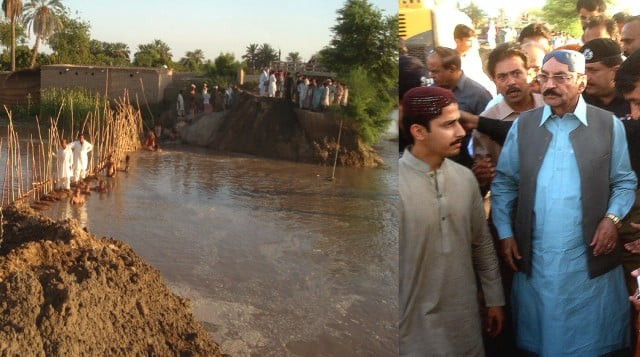400 houses damaged by canal breach in Khairpur

400 houses damaged by canal breach in Khairpur
The breach occurred in the Mirwah River Canal, RD240, at around 4 am, causing farmers living nearby to panic. However, since there were a few houses right near the canal, residents managed to start blocking the hole immediately.
The irrigation staff arrived with heavy machinery at around 9 am but the breach was too wide and the water flow too great to staunch it immediately.
Water inundated thousands of acres of land planted with sugarcane, cotton, jute and other crops. It also collected in pools in the mango orchards.
A nearby village, Dabi Talli, was also affected, where more than 300 houses were flooded. All furniture, household items and wheat bags stored in the houses were drenched and at least 100 mud houses were destroyed by the flooding water. The flow was so furious that by late afternoon, houses were up to six feet deep in water.
Affected people include Aftab Hussain, Suhbat Jaskani, Rustum, Khameso, Iqbal, Wazir Jaskani and others, whose homes fell down.
Aftab Hussain told Daily Express that the breach occurred because of the irrigation department’s negligence. “They knew that the water flow was very strong because of the rains,” he said, blaming the department for the losses, which he said were in thousands of rupees.
The flow was also strong because during rains, farmers shut off watercourses that supply water to their fields. This causes water levels in the canal to rise and surge.
Sukkur Chief Engineer Haroon Memon said, “We are inquiring into the matter, if irrigation staff is found responsible then we will take strict action against them. For now, we are trying to close the breach temporarily.”
However, till 7:30 pm, the breach was not filled in completely. Affected people demanded that the government should repair the breach and cater to those people whose property was damaged in the flooding.
Sindh Chief Minister Qaim Ali Shah also visited the village and met the affected persons. He surveyed the repair work and asked Khairpur DCO to submit a report on the incident within two weeks. He reassured people that once the report has been given to him and all assessments have been made, those who suffered damages to property will be compensated accordingly.
Just four days earlier, a 100-feet-wide breach occurred in the Ghotki Feeder near Ubauro. The gushing water from the gap in the canal inundated nine villages, damaging hundreds of houses and thousands of acres of fields. Irrigation officials had alleged that the breach was more likely than not caused by one of the two tribes, Kosh and Solangi, who were involved in clashes against one another.
According to SDO Irrigation Muhammad Moosa, the protocol is to decrease the water flow at the regulator, or water gate, and then fix the leak by filling it with mud.
Published in The Express Tribune, July 10th, 2010.



















COMMENTS
Comments are moderated and generally will be posted if they are on-topic and not abusive.
For more information, please see our Comments FAQ